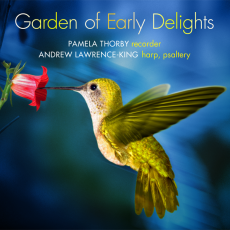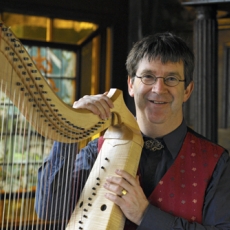Garden of Early Delights - Pamela Thorby & Andrew Lawrence-King - Fanfare
Bosch's triptych The Garden of Earthly Delights may have been intended as a didactic warning against debauchery, as some commentators suggest, but its central panel's hedonism is so exuberant as to verge paradoxically on the innocent - and suggest a glad morning where all is delight, in a place where Time lounges at ease gazing fondly on a bottle of wine. Certainly the music on this album has no measure of Biblical invocation, wailing, and warning about sin in it. It's all music close to the ground, warm in folk tones, cheerful and melancholy by turns. These are the solo and duet instrumentals that evolved out of experiments in the 16th-century Italian states, drawing away from polyphony and closer to an expressive monody. Meanwhile, the ornamented possibilities allowed by divisions - literally dividing the line into shorter notes, a common practice among improvising folk musicians - became increasingly prominent. The results were showcases for display of tonal resources in slower works, agility and precision in faster ones.
The mix on this release is excellent. It includes both new works of the day and variations of older ones, and folk-inflected pieces that stray from the Netherlands to Italy, Spain, and England. Most are likely to be unfamiliar, but Fontana's Sonata seconda has shown up on disc more than once, and Schop's Lachrime Pavaen is a very clear homage to Dowland's Lachrimae or Seven Teares. Five works are performed by Andrew Lawrence-King along for tonal variety, while both Pamela Thorby and Lawrence-King can be heard together on the other eleven.
J.F. Weber reviewed this album upon its initial release, back in 2008 (Fanfare 32:3). He liked it, referring to Thorby as "a thoroughly accomplished player." I would only add that she deploys a bold fancy, creating the sense that at any moment the melodic line could, and sometimes will, take arbitrary flight. King in turn can be heard on double harp, arpa doppia (a triple harp, with three courses of strings, and psaltery. The sound is excellent: not a trace of mechanism, but clean and very close, with good balance between the instruments. In short, a delightful album.


